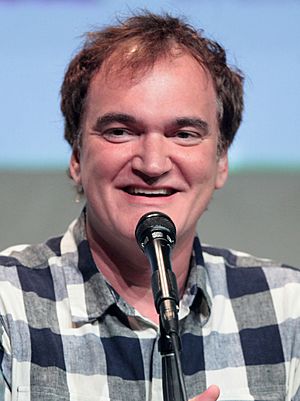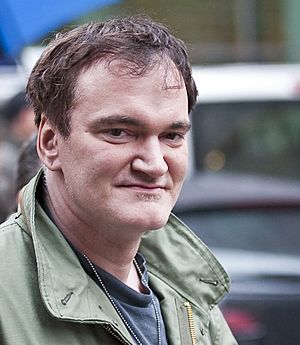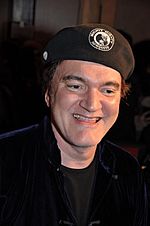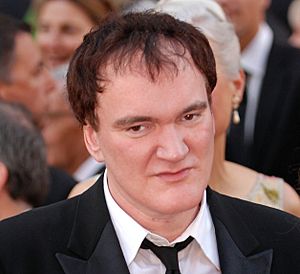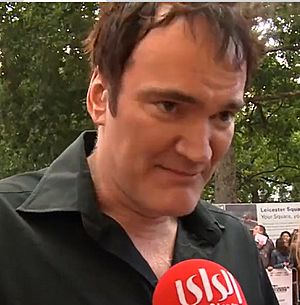Quentin Tarantino facts for kids
Quentin Jerome Tarantino ( born March 27, 1963) is an American film director, screenwriter and actor.
Tarantino began his career as an independent filmmaker with the release of the neo-noir crime drama film Reservoir Dogs in 1992. His second film, Pulp Fiction (1994), a dark comedy crime thriller, was a major success with critics and audiences winning numerous awards, including the Cannes Film Festival's Palme d'Or and the Academy Award for Best Original Screenplay. In 1996, he wrote and starred in the action-horror film From Dusk till Dawn. Tarantino's third film, the crime drama Jackie Brown (1997), paid homage to blaxploitation films.
In 2003, Tarantino directed Kill Bill: Volume 1, inspired by the traditions of martial arts films; it was followed by Volume 2 in 2004, with both volumes combined regarded as a single film. He then made Death Proof (2007), part of a double feature with Robert Rodriguez released under the collective title Grindhouse. His next film, Inglourious Basterds (2009), follows an alternate account of World War II. He followed this with Django Unchained (2012), a slave revenge Spaghetti Western, which won him his second Academy Award for Best Original Screenplay. His eighth film, The Hateful Eight (2015), is a revisionist Western thriller and opened to audiences with a roadshow release. His most recent film, Once Upon a Time in Hollywood (2019), is a comedy drama set in the late 1960s about the transition of Old Hollywood to New Hollywood. A novelization of the film written by Tarantino was published in 2021, becoming his debut novel.
During Tarantino's career, his films have garnered a cult following; as well as critical and commercial success, he has been considered "the single most influential director of his generation". Other major awards won by Tarantino include two BAFTAs and four Golden Globes.
Contents
Early life
Tarantino was born on March 27, 1963, in Knoxville, Tennessee, the only child of Connie McHugh and aspiring actor Tony Tarantino, who left the family before his son's birth. Tarantino identifies as having Cherokee descent through his mother, who is of Irish descent on her other side; his father is of Italian descent. He was named in part after Quint Asper, Burt Reynolds's character in the TV series Gunsmoke. Tarantino's mother met his father during a trip to Los Angeles. After a brief marriage and divorce, Connie left Los Angeles and moved to Knoxville, where her parents lived. In 1966, Tarantino returned with his mother to Los Angeles.
Tarantino's mother married musician Curtis Zastoupil soon after arriving in Los Angeles, and the family moved to Torrance, a city in Los Angeles County's South Bay area. Zastoupil accompanied Tarantino to numerous film screenings while his mother allowed him to see more mature movies. After his mother divorced Zastoupil in 1973, and received a misdiagnosis of Hodgkin's lymphoma, Tarantino was sent to live with his grandparents in Tennessee. He remained there less than a year before returning to California.
At 14 years old, Tarantino wrote one of his earliest works, a screenplay called Captain Peachfuzz and the Anchovy Bandit, based on the 1977 film Smokey and the Bandit. Tarantino later revealed that his mother had ridiculed his writing skills when he was younger; as a result, he vowed that he would never share his wealth with her. At 15, he dropped out of Narbonne High School in Harbor City, Los Angeles.
Film career
1980–1989: Early jobs and screenplays
Through the 1980s, Tarantino had a number of jobs. He worked as a recruiter in the aerospace industry and for five years he worked at Video Archives, a video store in Manhattan Beach, California. He was well known in the local community for his film knowledge and video recommendations; Tarantino stated, "When people ask me if I went to film school, I tell them, 'No, I went to films." In 1986, Tarantino was employed in his first Hollywood job, working with Video Archives colleague Roger Avary, as production assistants on Dolph Lundgren's exercise video, Maximum Potential.
Before working at Video Archives, Tarantino co-wrote Love Birds In Bondage with Scott Magill. Tarantino would go on to produce and direct the short film. Later, Tarantino attended acting classes at the James Best Theatre Company, where he met several of his eventual collaborators for his next film. In 1987, Tarantino co-wrote and directed My Best Friend's Birthday (1987). It was left uncompleted, but some of its dialogue was included in True Romance.
The following year, he played an Elvis impersonator in "Sophia's Wedding: Part 1", an episode in the fourth season of The Golden Girls, which was broadcast on November 19, 1988. Tarantino recalled that the pay he received for the part helped support him during the preproduction of Reservoir Dogs; he estimated he was initially paid about $650 but went on to receive about $3,000 in residuals over three years because the episode was frequently rerun due to it being on a "best of..." lineup.
1990–1999: Breakthrough and acclaim
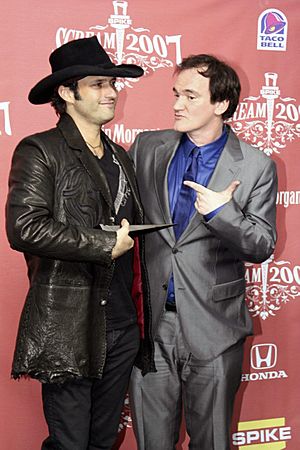
After meeting Lawrence Bender at a friend's barbecue, Tarantino discussed with him about an unwritten dialogue-driven heist film. Bender encouraged Tarantino to write the screenplay, which he wrote in three and a half weeks and presented to Bender unformatted. Impressed with the script, Bender managed to forward it through contacts to director Monte Hellman. Hellman cleaned up the screenplay and helped secure funding from Richard N. Gladstein at Live Entertainment (which later became Artisan, now known as Lionsgate). Harvey Keitel read the script and also contributed to the budget, taking a role as co-producer and also playing a major part in the picture. In January 1992, it was released as Tarantino's crime thriller Reservoir Dogs—which he wrote, directed, and acted in as Mr. Brown—and screened at the Sundance Film Festival. The film was an immediate hit, receiving a positive response from critics.
Tarantino's screenplay True Romance was optioned and the film was eventually released in 1993. The second script that Tarantino sold was for the film Natural Born Killers, which was revised by Dave Veloz, Richard Rutowski and director Oliver Stone. Tarantino was given story credit and stated in an interview that he wished the film well, but later disowned the final film. Tarantino also did an uncredited rewrite on It's Pat (1994). Other films where he was an uncredited screenwriter include Crimson Tide (1995) and The Rock (1996).
Following the success of Reservoir Dogs, Tarantino was approached by major film studios and offered projects that included Speed (1994) and Men in Black (1997), but he instead retreated to Amsterdam to work on his script for Pulp Fiction. Tarantino received the Academy Award for Best Original Screenplay, which he shared with Roger Avary, who contributed to the story. He also received a nomination in the Best Director category. The film received another five nominations, including for Best Picture. Tarantino also won the Palme d'Or for the film at the 1994 Cannes Film Festival. The film grossed over $200 million and earned positive reviews.
In 1995, Tarantino participated in the anthology film Four Rooms, a collaboration that also included directors Robert Rodriguez, Allison Anders and Alexandre Rockwell. Tarantino directed and acted in the fourth segment of "The Man from Hollywood", a tribute to the Alfred Hitchcock Presents episode "Man from the South". He joined Rodriguez again later in the year with a supporting role in Desperado. One of Tarantino's first paid writing assignments was for From Dusk till Dawn, which Rodriguez directed later in 1996, re-teaming with Tarantino in another acting role, alongside Harvey Keitel, George Clooney and Juliette Lewis. His third feature film was Jackie Brown (1997), an adaptation of Elmore Leonard's novel Rum Punch. A homage to blaxploitation films, it starred Pam Grier, who starred in many of the films of that genre in the 1970s. It received positive reviews and was called a "comeback" for Grier and co-star Robert Forster. Leonard considered Jackie Brown to be his favorite of the 26 different screen adaptations of his novels and short stories.
In the 1990s, Tarantino had a number of other minor acting roles, including in Eddie Presley (1992), The Coriolis Effect (1994), Somebody to Love (1994), All-American Girl (1995), Destiny Turns on the Radio (1995), and Girl 6 (1996). Also in 1996, he starred in Steven Spielberg's Director's Chair, a simulation video game that uses pre-generated film clips. In 1998, Tarantino made his major Broadway stage debut in a revival of the 1966 play Wait Until Dark.
2000–2009: Subsequent success
Tarantino went on to write and direct Kill Bill, a highly stylized "revenge flick" in the cinematic traditions of Chinese martial arts films, Japanese period dramas, Spaghetti Westerns, and Italian horror. It was based on a character called The Bride and a plot that he and Kill Bill's lead actress Uma Thurman had developed during the making of Pulp Fiction. It was originally set for a single theatrical release, but its four-hour running time prompted Tarantino to divide it into two movies. Tarantino says he still considers it a single film in his overall filmography. Volume 1 was released in 2003 and Volume 2 was released in 2004.
From 2002 to 2004, Tarantino portrayed villain McKenas Cole in the ABC television series Alias. In 2004, Tarantino attended the 2004 Cannes Film Festival, where he served as president of the jury. Volume 2 of Kill Bill had a screening there, but was not in competition. Tarantino then contributed to Robert Rodriguez's 2005 neo-noir film Sin City, and was credited as "Special Guest Director" for his work directing the car sequence featuring Clive Owen and Benicio del Toro. In May 2005, Tarantino co-wrote and directed "Grave Danger", the fifth season finale of CSI: Crime Scene Investigation. For this episode, Tarantino was nominated for the Primetime Emmy Award for Outstanding Directing for a Drama Series at the 57th Primetime Emmy Awards.
In 2007, Tarantino directed Death Proof. Released as a take on 1970s double features, under the banner Grindhouse, it was co-directed with Rodriguez who did the other feature which was the body horror film Planet Terror. Box-office sales were low but the film garnered mostly positive reviews.
Tarantino's film Inglourious Basterds, released in 2009, is the story of a group of Jewish-American guerrilla soldiers in Nazi-occupied France in an alternate history of World War II. The film opened in August 2009 to positive reviews with the highest box office gross in the US and Canada for the weekend on release. For the film, Tarantino received his second nomination for the Academy Award for Best Director and Academy Award for Best Original Screenplay.
2010–present: Established auteur
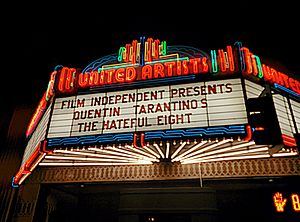
In 2011, production began on Django Unchained, a film about the revenge of a former slave in the Southern United States in 1858. The film stemmed from Tarantino's desire to produce a Spaghetti Western set in America's Deep South during the Antebellum Period. Tarantino called the proposed style "a southern", stating that he wanted "to do movies that deal with America's horrible past with slavery and stuff but do them like spaghetti westerns, not like big issue movies. I want to do them like they're genre films, but they deal with everything that America has never dealt with because it's ashamed of it, and other countries don't really deal with because they don't feel they have the right to". It was released in December 2012 and became his highest grossing film to date. He also received his second Academy Award for Best Original Screenplay.
In November 2013, Tarantino said he was working on a new film and that it would be another Western, though not a sequel to Django Unchained. On January 11, 2014, it was revealed that the film would be titled The Hateful Eight. The script was then leaked in January 2014. Aggrieved by the breach of confidence, Tarantino considered abandoning the production which was due to start the next winter and publish it as a novel instead. He stated that he had given the script to a few trusted colleagues, including Bruce Dern, Tim Roth and Michael Madsen. On April 19, 2014, Tarantino directed a live reading of the leaked script at the United Artists Theater in the Ace Hotel Los Angeles for the Live Read series. Tarantino explained that they would read the first draft of the script, and added that he was writing two new drafts with a different ending. Filming went ahead as planned with the new draft in January 2015. The Hateful Eight was released on December 25, 2015, as a roadshow presentation in 70 mm film-format theaters, before being released in digital theaters on December 30, 2015. The film received mostly positive reviews from critics.
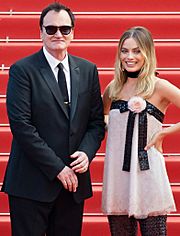
In July 2017, it was reported that Tarantino's next project would be Once Upon a Time in Hollywood, and that Leonardo DiCaprio would play Rick Dalton, a fictional star of television Westerns, with Brad Pitt as Dalton's longtime stunt double Cliff Booth; Margot Robbie would be playing real life actress Sharon Tate, portrayed as Dalton's next-door neighbor. Filming took place in the summer of 2018.
The film officially premiered at the 2019 Cannes Film Festival, where it was in competition for the Palme d'Or. Sony Pictures eventually distributed the film, which was theatrically released in July 2019. It received critical acclaim. The film earned 10 Oscar nominations at the 92nd Academy Awards including three for Tarantino for Best Picture, Best Director and Best Original Screenplay.
In November 2022, Tarantino revealed plans to shoot an eight-episode television series in 2023. No further details were provided.
Tenth and final film
In 2009, Tarantino said that he planned to retire from filmmaking when he is 60 to focus on writing novels and film literature. He is skeptical of the film industry going digital, saying, "If it actually gets to the place where you can't show 35 mm film in theaters anymore and everything is digital projection, I won't even make it to 60." He said though "not etched in stone" he intends to retire after making his tenth movie: "If I get to the 10th, do a good job and don't screw it up, well that sounds like a good way to end the old career." In January 2025, at the 2025 Sundance Film Festival, Tarantino said he was in "no hurry" to make his final film, preferring to wait at least a year, prioritizing to instead write a stage play.
As a producer
Tarantino has used his Hollywood power to give smaller and foreign films more attention. These films are often labeled "Presented by Quentin Tarantino" or "Quentin Tarantino Presents". In 1995, Tarantino formed Rolling Thunder Pictures with Miramax to release or re-release several independent and foreign features. By 1997, Miramax had shut down the company due to poor sales. The following films were released by Rolling Thunder Pictures: Chungking Express (1994, dir. Wong Kar-wai), Switchblade Sisters (1975, dir. Jack Hill), Sonatine (1993, dir. Takeshi Kitano), Hard Core Logo (1996, dir. Bruce McDonald), The Mighty Peking Man (1977, dir. Ho Meng Hua), Detroit 9000 (1973, dir. Arthur Marks), The Beyond (1981, dir. Lucio Fulci), and Curdled (1996, dir. Reb Braddock).
In 2001, he produced the US release of the Hong Kong martial arts film Iron Monkey, which made over $14 million worldwide. In 2004, he brought the Chinese martial arts film Hero to the US. It opened at number-one at the box office and eventually earning $53.5 million.
While Tarantino was in negotiations with Lucy Liu for Kill Bill, the two helped produce the Hungarian sports documentary Freedom's Fury, which was released in 2006. When he was approached about a documentary about the Blood in the Water match, a water polo match between Hungary and the USSR at the 1956 Melbourne Olympics, Tarantino said "This is the best story I've ever been told. I'd love to be involved".
In 2006, another "Quentin Tarantino presents" production, Hostel, opened at number-one at the box office with a $20.1 million opening weekend. He presented 2006's The Protector, and is a producer of the 2007 film Hostel: Part II. In 2008, he produced the Larry Bishop-helmed Hell Ride, a revenge biker film.
As a film exhibitor
In February 2010, Tarantino bought the New Beverly Cinema in Los Angeles. Tarantino allowed the previous owners to continue operating the theater, but stated he would make occasional programming suggestions. He was quoted as saying: "As long as I'm alive, and as long as I'm rich, the New Beverly will be there, showing films shot on 35 mm." Starting in 2014, Tarantino took a more active role in programming film screenings at the New Beverly, showing his own films as well as prints from his personal collection. In 2021, Tarantino announced that he had also purchased the Vista Theatre in Los Angeles, stating that he intends to keep it a first-run theatre, and that like The New Beverly it will only show movies on film
Appraisals
During his career, Tarantino's films have garnered a cult following, as well as critical and commercial success. In 2005, he was included on the annual Time 100 list of the most influential people in the world. He was also on The Daily Telegraph list of "Top 100 Living Geniuses" in 2007. Filmmaker and historian Peter Bogdanovich has called him "the single most influential director of his generation". Tarantino has received a star on the Hollywood Walk of Fame for his contributions to the film industry.
In 2013, a survey of seven academics was carried out to discover which filmmakers had been referenced the most in essays and dissertations on film that had been marked in the previous five years. It revealed that Tarantino was the most-studied director in the United Kingdom, ahead of Alfred Hitchcock, Christopher Nolan, Martin Scorsese and Steven Spielberg.
Books
In 2020, Tarantino signed a two-book deal with HarperCollins. He published his first novel in June 2021, a novelization of Once Upon a Time in Hollywood. It received positive reviews from The New York Times and The Guardian. The second book titled Cinema Speculation, about films of the New Hollywood era, inspired by film critic Pauline Kael was published on November 1, 2022.
Podcast
In June 2021, Tarantino announced plans to start a podcast with Roger Avary. The podcast is named after Video Archives, a video rental store that both directors had worked at prior to their film careers, and will feature the directors, and a guest, examining a film which could have been offered for rental at the store. The podcast premiered on July 19, 2022.
Personal life
Relationships and marriage
In the early 1990s Tarantino dated comedians Margaret Cho and Kathy Griffin. From 1995 to 1998 he dated actress Mira Sorvino. He was her date at the 68th Oscars ceremony where she won the Academy Award for Best Supporting Actress. In March 1998 they separated, with Sorvino releasing a statement that "[They] still love each other very much" but had reached a "mutual" decision to go their separate ways." From 2003 to 2005, Tarantino was in a romantic relationship with filmmaker Sofia Coppola. The two have remained friends since their breakup.
On June 30, 2017, Tarantino became engaged to Israeli singer Daniella Pick, daughter of musician Zvika Pick. They met in 2009 when Tarantino was in Israel to promote Inglourious Basterds. They married on November 28, 2018, in a Reform Jewish ceremony in their Beverly Hills Home. As of January 2020, they were splitting their time between the Ramat Aviv Gimel neighborhood of Tel Aviv, Israel and Los Angeles. On February 22, 2020, their son was born in Israel. On July 3, 2022, their second child, a daughter, was also born in Israel.
Faith and religious views
As a youth, Tarantino attended an Evangelical church, describing himself as "baptized, born again and everything in between". Tarantino said this was an act of rebellion against his Catholic mother as she had encouraged what might usually be considered more conventional forms of rebellion, such as his interests in comic books and horror films. Throughout the 1990s and 2000s, Tarantino was evasive about his religious beliefs but said he believed in God, whom he credited with giving him his writing ability.
In the 2010s, Tarantino continued ascribing his talents to gifts from God but expressed uncertainty regarding God's existence. "I think I was born Catholic, but I was never practiced," said Tarantino. "As time has gone on, as I've become a man and made my way further as an adult, I'm not sure how much any of that I believe in. I don't really know if I believe in God, especially not in this Santa Claus character that people seemed to have conjured up." In June 2021, Tarantino said he was an atheist.
Filmography
Tarantino has stated that he plans to make a total of just ten films before retiring as a director, as a means of ensuring an overall high quality within his filmography. He believes "most directors have horrible last movies," that ending on a "decent movie is rare," and that ending on a "good movie is kind of phenomenal." Tarantino considers Kill Bill: Volume 1 and Kill Bill: Volume 2 to be a single movie.
| Year | Title | Distribution |
|---|---|---|
| 1992 | Reservoir Dogs | Miramax |
| 1994 | Pulp Fiction | |
| 1997 | Jackie Brown | |
| 2003 | Kill Bill: Volume 1 | |
| 2004 | Kill Bill: Volume 2 | |
| 2007 | Death Proof | Dimension Films |
| 2009 | Inglourious Basterds | The Weinstein Company / Universal Pictures |
| 2012 | Django Unchained | The Weinstein Company / Sony Pictures Releasing |
| 2015 | The Hateful Eight | The Weinstein Company |
| 2019 | Once Upon a Time in Hollywood | Sony Pictures Releasing |
Collaborators
Tarantino has built up an informal "repertory company" of actors who have appeared in many roles in his films. Most notable of these is Samuel L. Jackson, who has appeared in five films directed by Tarantino and a sixth written by him, True Romance. Other frequent collaborators include Uma Thurman, who has been featured in three films and whom Tarantino has described as his "muse"; Zoë Bell, who has acted or performed stunts in seven Tarantino films; Michael Madsen, James Parks and Tim Roth, who respectively appear in five, four and three films. In addition, Roth appeared in Four Rooms, an anthology film where Tarantino directed the final segment, and filmed a scene for Once Upon a Time in Hollywood before it was cut for time.
Other actors who have appeared in several films by Tarantino include Michael Bacall, Michael Bowen, Bruce Dern, Harvey Keitel, Michael Parks, Kurt Russell, and Craig Stark, who have appeared in three films each.
Leonardo DiCaprio and Brad Pitt have each appeared in two Tarantino films, the second of which, Once Upon a Time in Hollywood, they appear in together. Like Jackson, Pitt also appeared in the Tarantino-penned True Romance. Christoph Waltz appeared in two Tarantino films, Inglourious Basterds and Django Unchained, winning a Best Supporting Actor Oscar for each role. Waltz had been working as an actor since the 1970s in numerous German movies and TV shows but was a relative unknown in America when he was cast as Hans Landa in his first film for Tarantino.
Editor Sally Menke, who worked on all Tarantino films until her death in 2010, was described by Tarantino in 2007 as "hands down my number one collaborator".
Awards, honors and recognition
Tarantino and his films have received numerous nominations for major awards, including Academy Awards, BAFTA Awards, Golden Globe Awards, Directors Guild of America Awards, and Saturn Awards. He has won the Academy Award for Best Original Screenplay twice, for Pulp Fiction and Django Unchained. He has been nominated four times for the Palme d'Or at the Cannes Film Festival, winning once for Pulp Fiction in 1994. In addition to his recognition for writing and directing films, Tarantino has received five Grammy Award nominations and a Primetime Emmy Award nomination.
In 2005, Tarantino was awarded the honorary Icon of the Decade at the 10th Empire Awards. He has received lifetime achievement awards from two organizations, Cinemanila, and from the Rome Film Festival in 2012. In 2011, Tarantino was given an Honorary César by the Académie des Arts et Techniques du Cinéma.
For his work on Pulp Fiction, Tarantino became the first director to ever sweep "The Big Four" critics awards (LA, NBR, NY, NSFC) and the first of the five directors (including Curtis Hanson, Steven Soderbergh, David Fincher, and Barry Jenkins) to do so as of 2025.
Recognition
During his career, Tarantino's films have garnered a cult following, as well as critical and commercial success. In 2005, he was included on the annual Time 100 list of the most influential people in the world. He was also on The Daily Telegraph list of "Top 100 Living Geniuses" in 2007. Filmmaker and historian Peter Bogdanovich has called him "the single most influential director of his generation". Tarantino has received a star on the Hollywood Walk of Fame for his contributions to the film industry.
In 2013, a survey of seven academics was carried out to discover which filmmakers had been referenced the most in essays and dissertations on film that had been marked in the previous five years. It revealed that Tarantino was the most-studied director in the United Kingdom, ahead of Alfred Hitchcock, Christopher Nolan, Martin Scorsese and Steven Spielberg.
| Year | Film | Academy Awards | Palme d'Or | BAFTA Awards | Golden Globe Awards | Saturn Awards | |||||
|---|---|---|---|---|---|---|---|---|---|---|---|
| Nom. | Wins | Nom. | Wins | Nom. | Wins | Nom. | Wins | Nom. | Wins | ||
| 1994 | Pulp Fiction | 7 | 1 | 1 | 1 | 9 | 2 | 6 | 1 | 1 | 1 |
| 1997 | Jackie Brown | 1 | 2 | 2 | |||||||
| 2003 | Kill Bill: Volume 1 | 5 | 1 | 7 | 2 | ||||||
| 2004 | Kill Bill: Volume 2 | 2 | 7 | 3 | |||||||
| 2007 | Death Proof | 1 | 1 | ||||||||
| 2009 | Inglourious Basterds | 8 | 1 | 1 | 6 | 1 | 4 | 1 | 7 | 1 | |
| 2012 | Django Unchained | 5 | 2 | 5 | 2 | 5 | 2 | 4 | 1 | ||
| 2015 | The Hateful Eight | 3 | 1 | 3 | 1 | 3 | 1 | 5 | |||
| 2019 | Once Upon a Time in Hollywood | 10 | 2 | 1 | 10 | 1 | 5 | 3 | 7 | 3 | |
| Total | 34 | 7 | 4 | 1 | 40 | 7 | 28 | 8 | 42 | 11 | |
Directed Academy Award performances
Under Tarantino's direction, these actors have received Academy Award nominations (and wins) for their performances in their respective roles.
| Year | Performer | Film | Result |
|---|---|---|---|
| Academy Award for Best Actor | |||
| 1994 | John Travolta | Pulp Fiction | Nominated |
| 2019 | Leonardo DiCaprio | Once Upon a Time in Hollywood | Nominated |
| Academy Award for Best Supporting Actor | |||
| 1994 | Samuel L. Jackson | Pulp Fiction | Nominated |
| 1997 | Robert Forster | Jackie Brown | Nominated |
| 2009 | Christoph Waltz | Inglourious Basterds | Won |
| 2012 | Christoph Waltz | Django Unchained | Won |
| 2019 | Brad Pitt | Once Upon a Time in Hollywood | Won |
| Academy Award for Best Supporting Actress | |||
| 1994 | Uma Thurman | Pulp Fiction | Nominated |
| 2015 | Jennifer Jason Leigh | The Hateful Eight | Nominated |
See also
 In Spanish: Quentin Tarantino para niños
In Spanish: Quentin Tarantino para niños
- Quentin Tarantino Film Festival, a film festival in Austin, Texas, United States, hosted by Tarantino
- QT8: The First Eight, a 2019 documentary about Tarantino


